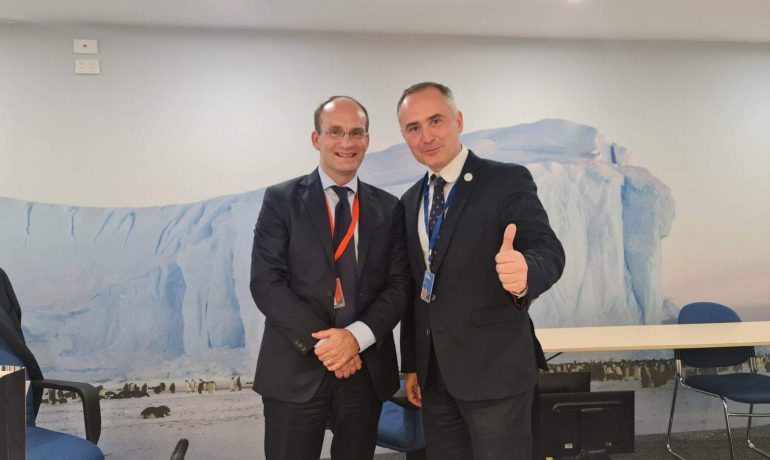Today, 4 November 2022, the Forty-first Meeting of the Commission for the Conservation of Antarctic Marine Living Resources (CCAMLR) during which Ukraine assumed the chairmanship of this organization was closed. The Commission agrees a set of conservation measures that determine the use of marine living resources in the Antarctic. This region is important not only for scientific research on the state of the entire planet, but also for fishery.
Ukraine’s chairmanship will last 2 years till the autumn of 2024. It is important that CCAMLR to be chaired by our state for the first time since becoming a member of the organization in 1994. The new CCAMLR Chair is Mr Vitalii Tsymbaliuk – Ukrainian diplomat, the former Ambassador of Ukraine to the Republic of Chile, with whom the NASC has many years of fruitful cooperation. In particular, the development of marine protected areas (MPA):
● in the Antarctic Peninsula area (this is where our Akademik Vernadsky station is located, and this was the initiative of Ukraine approved by the Commission in 2019);
● In the Weddell Sea area;
● In East Antarctica.
Imagine, the total area of these three territories is approximately equal to the area of India and Pakistan put together. Creation of the mentioned MPAs will contribute to the fulfillment of the global obligation to turn 30% of the earth’s land and oceans into protected areas by 2030, and most importantly, it will significantly protect the marine inhabitants of the Southern Ocean: whales, seals, penguins, etc.
Unfortunately, at this meeting, none of the proposals for the development of new MPAs were supported by the Commission as a result of objections from russia and China, but work on this will continue.
Moreover, it is planned to engage our scientific research vessel Noosfera for ecological, oceanological and biological research in Antarctic waters.
Also, Ukraine continues to be represented in the Southern Ocean by its fishing fleet in two types of fishery – toothfish and Antarctic krill, which makes Antarctica an important fishing region for us. Fishing here is carried out in accordance with internationally distributed limits, with the obligation to conduct scientific research of marine resources. It should be noted that before the war, fishing in the Antarctic by Ukrainian fishermen exceeded the entire catch of fish in the Black and Azov seas, as well as the rivers of Ukraine. In conditions of the war with russia, fishing in the Antarctic remains the only way for us to provide Ukrainians with our own products.
The next CCAMLR meeting, which will have the status of a special one, dedicated to the development of new MPAs, will be held in the spring of 2023 in Chile. The meeting will be chaired by Ukraine.
We are proud that even in the difficult conditions of war Ukraine makes an active contribution to the preservation of Antarctic marine ecosystems and defends its own interests in the international arena.


